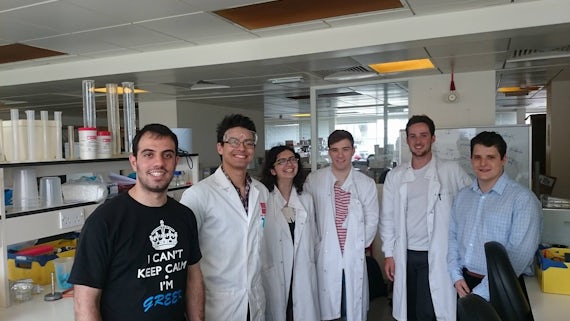Cardiff iGEM team heads to Boston
24 Hydref 2016

A team of Cardiff University students heads to Boston this week to take part in the international iGEM competition – the first Welsh team to do so.
Founded by students at the Massachusetts Institute of Technology in 2003, the iGEM competition encourages candidates to think about synthetic biology - the artificial engineering of biological systems in order to find new uses for them in an academic, medical or industrial setting.
Since its inception, the competition has continued to grow and this year boasts 290 teams from 41 countries across the world.
The Cardiff team comprises second-year students Christian Donohoe, Asal Golshaie, Andrew Brimer, Robert Newman, Laura Bird, David McMaster and Nikolas Demetriou, and was put together by Dr Geraint Parry, a prominent plant cell biologist and lecturer at Liverpool University.
For their project, the team decided to assess the viability of using a novel bioluminescence detection system to develop an improved point-of-care diagnostic test for sexually transmitted infections.
As well as undertaking the research itself, the team has also carried out a number of outreach and engagement activities – a key component of the iGEM competition. These include creating an iGEM WIKI page, attending the European iGEM team meet up in Paris, holding a luciferase demonstration at Techniquest, and participating in the Biology Rocks event at the National Museum Cardiff.
On 26 October, the team will fly out to the iGEM Giant Jamboree in Boston where they will deliver a twenty minute presentation on their research project. This will be assessed by a panel of judges, alongside the group’s WIKI page.
Reflecting on the benefits of participating in iGEM, team member Christian Donohoe studying at the School of Chemistry, said
“By working on the iGEM project, I’ve developed skills outside of my degree – for example, learning how to clone DNA makes many biochemistry jobs seem less out of reach. In addition, for my placement next year in Biophysical Chemistry, the experience of being in a real workplace will make the transition from University student to assistant researcher much easier.”
Another member of the group, Laura Bird from the School of Biosciences, added
“I applied for iGEM because it sounded like a great opportunity, to not only spend my summer gaining further experience in lab work, but also to communicate and work collaboratively with other international teams.
I have gained many skills during the project, including enhancing my knowledge of lab-based experiments, and science communication. Having the opportunity to present our project at the Giant Jamboree in Boston will improve my confidence and presenting skills, which will be a great benefit to my future career.
This article was adapted from a story that originally appeared in Gair Rhydd.